构词法(2)
英语构词法 (2).
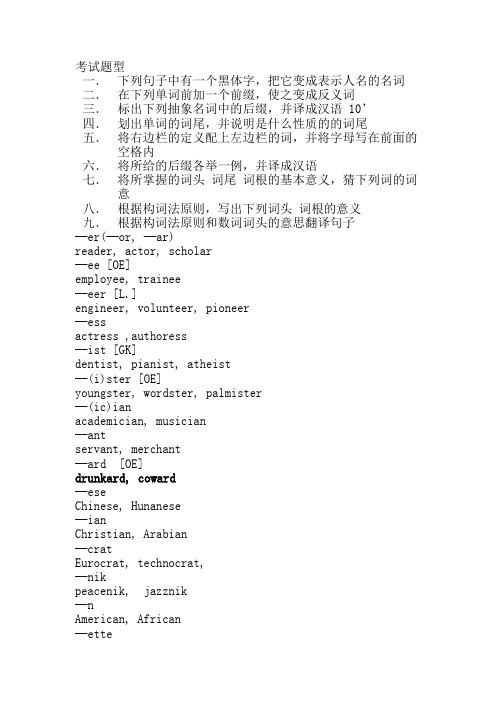
考试题型一.下列句子中有一个黑体字,把它变成表示人名的名词二.在下列单词前加一个前缀,使之变成反义词三.标出下列抽象名词中的后缀,并译成汉语 10’四.划出单词的词尾,并说明是什么性质的的词尾五.将右边栏的定义配上左边栏的词,并将字母写在前面的空格内六.将所给的后缀各举一例,并译成汉语七.将所掌握的词头词尾词根的基本意义,猜下列词的词意八.根据构词法原则,写出下列词头词根的意义九.根据构词法原则和数词词头的意思翻译句子─er(─or, ─ar)reader, actor, scholar─ee [OE]employee, trainee─eer [L.]engineer, volunteer, pioneer─essactress ,authoress─ist [GK]dentist, pianist, atheist─(i)ster [OE]youngster, wordster, palmister─(ic)ianacademician, musician─antservant, merchant─ard [OE]drunkard, coward─eseChinese, Hunanese─ianChristian, Arabian─cratEurocrat, technocrat,─nikpeacenik, jazznik─nAmerican, African─ettecigarette, statuette, roomette─kinlambkin, manikin, prince kin─letkinglet, booklet, ringlet─lingduckling, prince ling, birdling ─enmaiden, chicken, kitten─elparcel,model,citadel─etfloweret, islet, tag let─cleparticle, molicle─(e)teriafruiteria, grocerteria二.加前缀法.表示否定的前缀:A.纯粹表示否定的有:a-,dis-,in-,non-,un-;B.表示“错误”的有:mis-C.表示“反动作”的有:de-,dis-,un-D.表示“反对”的有:anti-,contra-,counter-atypicalamoralatheism 无神论asexual 无性别的anonymous在辅音h(不发音)之前也用an-:anarchism无政府主义dishonestdisagreedisallow 不许,拒绝discouragedisforest 砍伐树林dissolvedispel 驱散inhuman不人道的illegalImmoralirresponsibleirresistible 不可抵抗nonconductor 非导体nonmetal 非金属的nonstopnon-standard 不标准的unhappyuncomfortableunsystematic无系统的unlimitedunworldly非现世的uneducatedUncivilized未开化的misbehave行为不当misprintmisplay(球类等运动中)失误misleadingdevaluation贬值de-表示“remove from”deport驱逐出境deforest砍伐森林degas 排气消除毒气unbutton 解纽扣uncover 揭开盖子untomb从坟墓中掘出antipathy 憎恶anti-Japanese war 抗日战争antidote 解毒药antacid 防酸剂Antarctic 南极contradict反驳 ,同…相矛盾contrary 相反的counteract 还手counterplot 将计就计counterview 反对意见retroact 倒行,起反作用retrospect 回顾 retrogress倒退三.抽象名词词尾•─age•marriage, shortage, postage•─al•approval, denial, refusal•─ance•assistance, elegance,brilliance•─cy•accuracy, Intimacybankrupcy•─dom•freedom, wisdom, filmdom•─ful•glassful, handful, houseful•─hood•fatherhood, Childhoodneighborhood•─ing•bedding, learning, washing•─ism•Marxism, socialism, Londonism•─ity (-ty)•curiosity, majority, unity,•safety•─ment•argument, development, instrument•─ness•friendliness, goodness, carelessness •─ship•authorship, citizenship, leadership•─ure•failure, departure, closure, exposure ---ery, --ry•robbery, greenery, nurserysurgery, slavery, poultry, poetry•─®ama•telerama, cinerama•─itis•appendicitis(阑尾炎)odontitis(牙炎),neuritis(神经炎)•─th•growth, warmth, fourth四.单词词尾☐加否定前缀“in- (及其变体)”, ‘‘non-, un-” 构成下列单词的反义词:☐1. im mature 2. ir regular☐3. in considerate 4. ig noble☐5. non-contentious☐6. il legitimate☐7. non-metal☐8. im passive☐9. non-ferrous☐10. in accuracy☐11. un endurable☐12. in variance☐13. non-inductive☐14. il legible☐15. un reasonable☐16. ir rational☐17. un scrupulous☐18. non-staple☐19. im balance☐20. il legalize☐写出下列单词中前缀的意思:☐1. ante cedent 2. by product☐3. in clude 4. intra mural☐5. intro spect 6. post graduate☐7. pre cede 8. retro spect☐9. super man 10. pro ceed☐11. sub scribe 12. trans mit☐13. ultra-red 14. a pocopeEx. 2写出表示数目的希腊语前缀和拉丁语前缀:☐希腊语前缀拉丁语前缀☐half hemi- demi-, semi-,☐one mono- uni-,☐two di-, duo-, bi-☐three tri-☐four☐five☐six☐seven☐eight☐nine☐ten☐hundred☐thousand将右边栏里的定义配上左边栏里的词, 并将字母在前面的空格内 :☐1. ___ audio logy a. the study of speech sound☐2.___ audiometer b. an instrument used tomake weak sounds louder☐3. ___ chronometer c. the science of hearing☐4. ___ microphone d. in instrument formeasuring time accurately☐5. ___ phonology e. an instrument formeasuring hearing☐6. __ superscript a. the examinationof one’s own thought☐7. __ transmit b. to draw a linearound☐8. __ supervisor c. to send from oneperson or place to another ☐9. __ circumscribe d. a boss☐10. __ introspection e. letter orsomething written above ☐11. __ manual a. the belief that there is onlyone god☐12. __ monogamy b. the science or study of religious truth☐13. __ monotheism c. giving no name☐14. __ theology d. done by the hand orhands☐15. __ anonymous e. the practice or condition ofhaving onemarriage partner☐16. __ archenemy a. a mistake in printing☐17. __ sympathy b. the chief bishop☐18. __ archbishop c. a hearer orlistener☐19. __ auditor d. a chief or mainopponent☐20.__ misprint e. agreement in feelings between persons☐21. __ corpse a. a passage to one side☐22. __ decapitate b. fat; large ofbody☐23. __ corpulent c. to cut off thehead of☐24. __ bypass d. a dead body☐25. __ portage e. fat; large of body☐26. __ biology a. believe it☐27. __ credit b. the study of science☐28.__ uniform c. throw away☐29.__ retrogress d. go back☐30.__ eject e. one form☐31. __ corpse a. a passage to one side☐32. __ decapitate b. fat; large of body☐33. __ corpulent c. to cut off the head of☐34. __ bypass d. a dead body☐35. __ portage e. fat; large of body☐36. __biology a. believe it☐37.__credit b. the study of science☐38.__uniform c. throw away☐39.__retrogress d. go back☐40.__eject e. one form根据所掌握的词头、词根、词尾的基本意义,猜出划线部分单词或词组的意思。
初中英语构词法 2

2、句子成分
英语句子成分分为七种: 主语、谓语、宾语、定语、 状语、表语、宾语补足语。
1、主语是句子所要说的人或事物,回答是“谁” 或者“什么”。通常用名词或代词担任。 如:I’m Miss Green. 2、谓语动词说明主语的动作或状态,回答“做(什么)”。 主要由动词担任。如:Jack cleans the room.
• 5)形容词转化为名词 表示颜色的形容词常可转化为名词(如下①);某些形容词如old, young, poor, rich, wounded, injured等与the连用,表示一类人,作主语 时,谓语用复数(如下②)。例如: You should be dressed in black at the funeral.你在葬礼中该穿黑色 衣服。 The old in our village are living a happy life.我们村的老年人过着幸 福的生活。
九、连接词 十、简单句 十一、句子成分 1、主语: 2、谓语: 3、宾语: 4、表语: 5、定语: 6、状语: 7、宾语补足语: 十二、简单句五种基本句型: 十三、并列复合句 十四、主从复合句 十五、直接引语和间接引语(初中不作特别要求) 十六、倒装句 十七、附加注释
英语词类: 1、名词(n.): 表示人、事物、地点或抽象概念的名称。 如:boy, morning, bag, ball, class, 2、代词(pron.): 主要用来代替名词。如:who, she, you, it . 3、形容词(adj..):表示人或事物的性质或特征。 如:good, right, white, orange . 4、数词(num.): 表示数目或事物的顺序。 如:one, two, three, first, second, third, fourth. 5、动词(v.): 表示动作或状态。 如:am, is, are, have, see
初升高衔接英语词汇教学入门之构词法词汇速记解读课件(2)

例词 suitable(适合的),responsible(负 责的),acceptable(可接受的)
natural,national(国家的), personal
powerful(强大的),faithful(忠诚的) colorful(多彩的)
-less(否定) 不......的 fearless(无畏的),useless(无用的) helpless(无助的)
Exercise
closed form
sightseeing crossroad outbreak widespread Pickpocket database
hyphenated form take-off get-together kind-hearted
open form
hard disk waiting room computer system search engine web browser
表示:中间
加在名词前(= middle)
例词
foresee(预见), foreleg(前足), foretell(预言,预测), foreknow prepay(预付), prewar, preschool, prehistory
post-war, post-date post-graduate
midday, midnight
表示否定意义的前缀
2. 表示错误的意义
male-,mal-:malfunction, maladjustment(失调) mis-: mistake, mislead
3. 表示反对的意义
anti-: antibody (抗体),anti-war counter-:counterpart, counterclockwise
学生版 构词法(二) 前缀
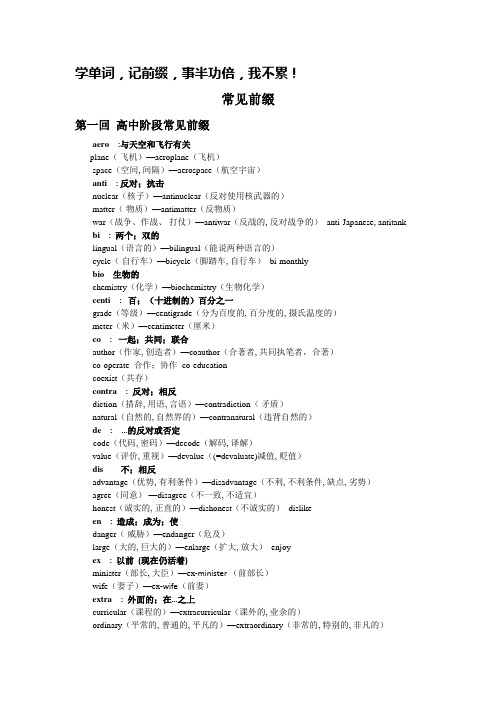
学单词,记前缀,事半功倍,我不累!常见前缀第一回高中阶段常见前缀aero :与天空和飞行有关plane(飞机)—aeroplane(飞机)space(空间, 间隔)—aerospace(航空宇宙)anti : 反对;抗击nuclear(核子)—antinuclear(反对使用核武器的)matter(物质)—antimatter(反物质)war(战争、作战、打仗)—antiwar(反战的, 反对战争的)anti-Japanese, antitank bi : 两个;双的lingual(语言的)—bilingual(能说两种语言的)cycle(自行车)—bicycle(脚踏车, 自行车)bi-monthlybio 生物的chemistry(化学)—biochemistry(生物化学)centi : 百;(十进制的)百分之一grade(等级)—centigrade(分为百度的, 百分度的, 摄氏温度的)meter(米)—centimeter(厘米)co : 一起;共同;联合author(作家, 创造者)—coauthor(合著者, 共同执笔者,合著)co-operate 合作;协作co-educationcoexist(共存)contra : 反对;相反diction(措辞, 用语, 言语)—contradiction(矛盾)natural(自然的, 自然界的)—contranatural(违背自然的)de : …的反对或否定code(代码, 密码)—decode(解码, 译解)value(评价, 重视)—devalue((=devaluate)减值, 贬值)dis 不;相反advantage(优势, 有利条件)—disadvantage(不利, 不利条件, 缺点, 劣势)agree(同意)—disagree(不一致, 不适宜)honest(诚实的, 正直的)—dishonest(不诚实的)dislikeen : 造成;成为;使danger(威胁)—endanger(危及)large(大的, 巨大的)—enlarge(扩大, 放大)enjoyex : 以前(现在仍活着)minister(部长, 大臣)—ex-minister (前部长)wife(妻子)—ex-wife(前妻)extra : 外面的;在…之上curricular(课程的)—extracurricular(课外的, 业余的)ordinary(平常的, 普通的, 平凡的)—extraordinary(非常的, 特别的, 非凡的)fore : 前;预先head(头)—forehead(前额)warn(警告)—forewarn(预先警告)foretell, forecastil 不legal(法律的, 合法)—illegal(违法的, 不合规定的)im : 不moral(道德(上)的, 精神的,道德)—immoral(不道德的, 邪恶的, 放荡的)possible(可能的)—impossible(不可能的)in : 不direct(径直的, 直接的)—indirect(间接的, 迂回的)incorrectsensitive(敏感的, 灵敏的)—insensitive(对...没有感觉的, 感觉迟钝的)inter 在……之间;在……当中change(改变, 变化)—interchange((指两人等)交换,相互交换)internetnational(国家的, 民族的)—international(国际的, 世界的,国际性组织, 国际比赛)ir : 不regular(规则的, 有秩序的)—irregular(不规则的, 无规律的)responsible(有责任的, 可靠的)—irresponsible(不负责任的, 不可靠的)kilo : 千gram(克,)—kilogram(〔物〕千克, 公斤)meter(米)—kilometer(公里)mal : 坏;不好使function(官能, 功能, 作用)—malfunction(故障)treat(宴请, 款待)—maltreat(虐待, 滥用)micro : 相当小computer(计算机, 电脑)—microcomputer(微进化)microwave, microphone electronics(电子学)—microelectronics(〔电子]微电子学)mid : 中day(天, 白天)—midday(正午)night(夜, 夜晚)—midnight(午夜)mini : 迷你;短bus(公共汽车)—minibus(小型公共汽车)skirt(裙子)—miniskirt (超短裙)mis : 不好;错误fortune(运气, 好运)—mis/un/fortune(不幸, 灾祸)understand(懂, 了解)—misunderstand(误解, 误会)misleadmulti : 多;不是一个purpose(目的, 意图)—multipurpose(多种用途的, 多目标的)national(国家的, 国立〔有]的, 民族的)—multinational(多民族的,)non : 不sense 理性,认识—nonsense(胡说, 废话)non-smoking, non-stopout : 外;超过live(活的, 生动的)—outlive(比...长命, 比...耐久)door(门, 通道, 家, 户)—outdoor(室外的, 户外的, 野外的)over :太多;在…..上;超过head(头,头的, 主要的)—overhead(在头上的,在头顶上, 在空中, 在高处)time(时间, 时侯, 时机, )—overtime(超时, 加班, 延长时间,超时的, 加班的,加班地,使超时)post 在…..后graduate((大学)毕业生, 研究生—postgraduate(研究所学生, 研究生,毕业后的)post-reading(阅后)war(战争,作战, 打仗)—postwar(战后的)pre : 在……之前;预先pay(薪水, 工资,支付)—prepay(预付)pre-listening (听力前)war(战争,作战, 打仗)—prewar(战前的,在战前)prepare, prefixre : 再unite(联合, 团结)—reunite((使)再结合)rebuild (重建)use(使用)—reuse(再使用,重新使用)retell (复述)recall, rewriteself : 借助自己employed(雇用, 用, 使用)—self-employed(自己经营的;个体户的)self-taught (自学) self-educated (自学的;自修的) self-serviceself-confident (自信的) self-defence (自卫) self-help (自助;自立)semi : 半;部分的circle(圆周, 圆形物)—semicircle(半圆形)final(决赛)—semifinal(半决赛)step : 不是亲生的但通过再婚的mother(母亲, 妈妈)—stepmother(继母)children(孩子, 孩子们)—stepchildren(继子,继女)super 多;大market(市场)—supermarket(超级市场)supernatural(超自然的, 神奇的,超自然物, 不可思议的事)supermantele : 远的;远距离的screen(屏, 银幕)—telescreen(电视屏幕,荧光屏)telephone,televisontrans : 横穿;通过;超越Atlantic(大西洋)—transatlantic(大西洋彼岸的)transplant, translatetri : 三;三倍angular(有角的)—triangular(三角形的)cycle(自行车)—tricycle(三轮车, 机器三轮车)un : 不certain(确定的, 必然的, 可靠的)—uncertain(无常的, 不确定的, 不可预测的, 靠不住的)fortunate(幸运的, 幸福的)—unfortunate(不幸的, 使人遗憾的)unimportant, unlucky你以为这样就完了?感觉自己已经打通任督二脉了?呵呵!!!这只是热身而已~~~C’mon!第二回常见前缀之扩展)))))))))))))))))))))))))))))))))))))))))))))))))))))))))))))))))))))))))))))))))))))))))))))))))))))))))))))))))))))) 记住我们!!!!英语中能改变词性的前缀主要有三个:a-、be-和en-a-主要加在名词或动词前面,使之成为表语形容词。
1-构词法记词(2)(含答案)

recognition
repeat
[记]
[记] recogni(ze)+tion认识+名词后缀 [例] instant recognition
re+peat重复+寻求→反复寻求→ 重复 [例] repeat a mistake
trans 横过,穿越;转换(前缀) transparent
[记] /træn'spærənt/ adj.透明的
transmit
/træns'mɪt/ v.运输;传播
trans+parent通过+父辈→毫无 隐瞒→透明的
[记] [记] pre+caution在前+谨慎 [例] precautions against theft
precaution
/prɪ'kɔːʃən/ n.预防措施
re重复,一再(前缀) recite
[记] /rɪ'saɪt/ v.背诵
relax
/rɪ'læks/ v.放松
re+cite重复+引用(别人的话)→ 背诵 [例] recite a poem
over 超过,越过;在上方(前缀) overcoat
/'əʊvəkəʊt/ n.大衣
overlook
[记]
/ˌəʊvə'lʊk/ v.忽视;俯视
[记] over+coat超大+外套 [例] wear a cotton overcoat /ˌəʊvə'hed/ adj./adv.(在)头上的
over+look越过去+看→不看近 处的东西→忽视 [例] overlook a mistake /ˌəʊvə'weɪt/ overweight n.超重 [记] over+weight超过+重量 [例] 200 dollars for overweight charge
构词法(2)
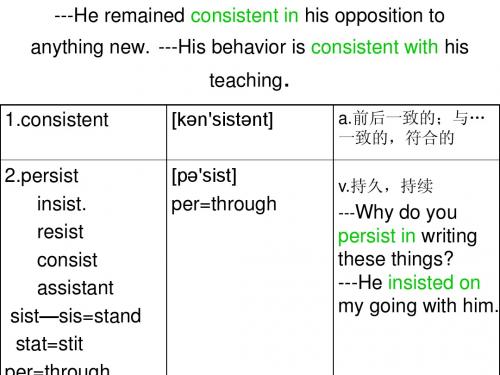
5.institute
['institju:t] Replace with
n.学会,研究所,学 院 v.设立,设置
6.substitute
['sʌbstitju:t]
n.代替人;代替物;代用 品 v.(for)替代,取代
n.法令,法规;成文法
['stæ tju:t]
I made a mistake and I will assume responsibility for it.
10.assume [ə'sju:m] sum=take抓, 摘,拿,取,吃 summer sume spring sprinkle harvest carve砍
wind---winter
v.承担,担任;假装;
假设; 采取;呈现
---The kids soon consumed all the food on the table.
---They proposed that he should resume his job as farmhand.
11.consume resume presume 12.resume 13.presume [kən'sju:m ] vt.消费,消耗; 吃完,喝光 consumer consumption [ri'zju:m] [pri'zju:m]
n.迷信;迷信行为
7.superstition
[,tistic [stə'tistik] statist国家主义者; 统计学者 statist
statistics统计学 statistical.a.
高职升本词汇(构词法,单词,词组) (2)
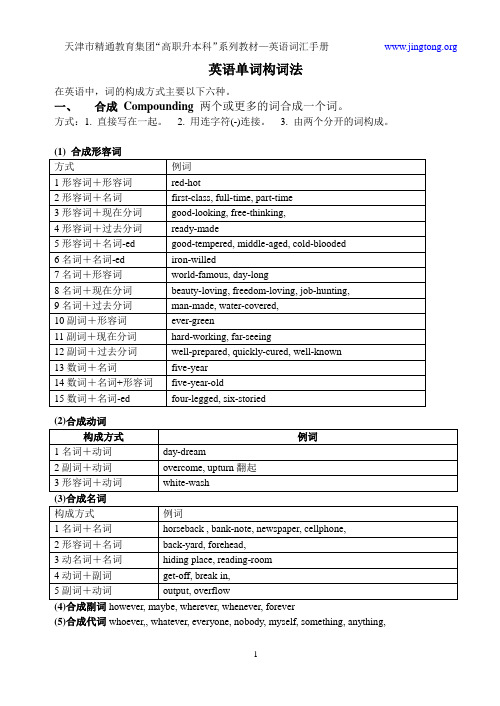
英语单词构词法在英语中,词的构成方式主要以下六种。
一、合成Compounding 两个或更多的词合成一个词。
方式:1. 直接写在一起。
2. 用连字符(-)连接。
3. 由两个分开的词构成。
(4)合成副词however, maybe, wherever, whenever, forever(5)合成代词whoever,, whatever, everyone, nobody, myself, something, anything,二、派生Derivation指一个词不变化词形,而由一种此类转化为另一种词类或几种词类。
1. 名词和动词之间的转化telephone电话——打电话, drink喝——饮料, record录音——记录, name, date, hand, study,2. 形容词转化为动词perfect完美的——使完善3.名词转化为形容词(副词) front前面——前面的4.形容词转化为名词chief 主要的——首领四、截短法(缩略法)截短法,即将单词缩写,词义和词性保持不变,主要有截头、去尾、截头去尾等形式。
1)截头telephone→phone aeroplane→plane omnibus→bus2)去尾mathematics→maths co-operate→co-op examination→examkilogram→kilo laboratory→lab taxicab→taxi3)截头去尾influenza→flu refrigerator→fridge prescription→script五、混合法(混成法)混合法,即将两个词混合或各取一部分紧缩而成一个新词。
后半部分表示主体;前半部分表示属性。
news broadcast→ newscast新闻广播television broadcast→telecast电视播送六、首尾字母缩略法首尾字母缩略法,即用单词首尾字母组成一个新词。
2021届高三英语一轮复习词法复习 构词法2

eggplant
资料
pineapple
资料
hamburger
Step 3: Knowledge learning
Abbreviation 缩写
用单词或短语的部分内容指代整体。
Step 3: Knowledge learning
目前,现在 n.
礼物
at present 目前,现在
present
v. 颁发;授予;赠送
present a gift 赠送礼物
资料
adj.
合成单词
1. 目前的;现存的
present-day adj. 现在的 2. 现场的;出席的
presentation n. 赠送;授予
Step 3: Knowledge learning
UNESCO = United Nations Educational, Scientific and Cultural Organization 联合国教科文组织
5. In 1963 the UN set up the World Food Programme, one of whose purposes is to relieve worldwide starvation. (2017 年江苏卷) UN = United Nations 联合国
名词+形容词 名词+现在分词 名词+过去分词
形容词+名词 形容词+现在分词 形容词+过去分词
副词+现在分词 副词+过去分词
介词+名词
其他合成词
every 每个+ one 一 = everyone 每人 through 穿过+ out 出来= throughout 遍及
转化和前后缀
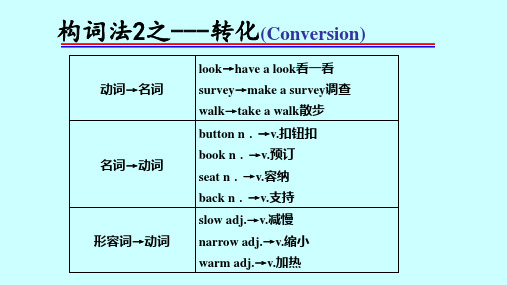
serve→servant 仆人 -antant participate→participant参加者参加者
assist→assistant助手;图书管理员助手;图书管理员
independent 词根
adj.
depend
dependable 残疾的
disable
独立的
不可能的
反义
incorrect
mid- super-
out- vice- sub- multi- semi- auto-
micro
midnight午夜 supernatural超自然的 outnumber在数量上超过 vice-chairman副主席 subtropical亚热带 multicolored多色的 semi-final半决赛 automatic自动的 microscope显微镜 micro-wave oven 微波炉
undergraduate
词根
词根
独立的
不可能的
反义
correct
反义
adj. 反义
n.
残疾的
n. n.
近义
Words Building n.
n.
误解
词根
大学生
词根
root
independent
adj
depend
dependable 残疾的 disable
独立的
不可能的
incorrect
impossible
构词法4之---后缀
一、形容词加-ly变为副词的规律 1.一般情况加-ly 如: real→really/careful→carefully/polite→politely/quick→quickly 2.“辅音字母+y”结尾的,将y改为-ily 如: angry→angrily/busy→busily/heavy→heavily 3.以-ble结尾的,将ble改为-bly 如: probable→probably/possible→possibly 4.个别单词,去掉e再加-ly 如:gentle→gently/true→truly 5.以-ic结尾的,加-ally 如:basic→basically/energetic→energetically
高中高考语法填空常考英语构词法 2

teach
catch
• sought—sought • shook----shaken • showed----shown • sank-----sunk/sunken • spread----spread • swam----swum • tore----torn(bear—bore---born) • wove---woven • thought---thought • bought---bought • fought---fought • brought—brought • taught----taught • caught---caught
动词ing 形式 ---需要双写的动词
admit 承认
ban禁止
beg恳求
begin开始
bid投标
chat闲聊
clap拍掌
commit 犯(罪)
cut
dig挖
dip浸泡
drag
equip装备于… forget忘
hit敲击
hug拥抱
jog慢跑
let让
mop用拖把拖地板 nod 点头
动词ing 形式 ---需要双写的动词
Card 5 动词(名词)+able(tive, ing)=形容词
• reason • comfort • rely • change • access • enjoy • suit • honor • compare • sense • subject
• reasonable • Comfortable 去e • reliable(去y改iable) • changeable(不去e) • accessible(加ible)
• enjoyable
• suitable
构词法二-派生词-转化词
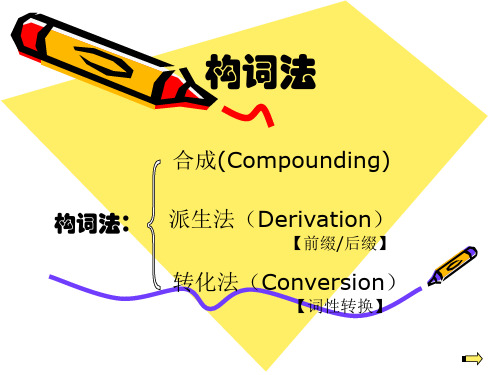
solar system
太阳系
remote control 遥控
(3) v-ing +另一词
washing machine 洗衣机 driving license 驾驶执照
(4) 其他方式
by-product editor-in-chief
副产品 主编
2. 合成形容词
(1) 过去分词或带ed词尾的词构成。
构词法
合成(Compounding)
构词法:
派生法(Derivation)
【前缀/后缀】
转化法(Conversion)
【词性转换】
Classify: pathway freedom darkest place unfair
lock everyday riverside nurse disagree
piano/ ist artist child hood act or / ress brother hood solute/ion
conclude/ion
2).形容词后缀:
-ous -ful -y
dangerous, humorous helpful, careful thankful Healthy snowy windy
=
color- blind
+
=
sleep-walk
+
=
sleep-walker
1. 合成名词
(1) n+n air conditioner blood pressure income tax credit card
(2) adj + n central bank fast food
空调 血压 所得税 信用卡
常见构词法归纳 (2)
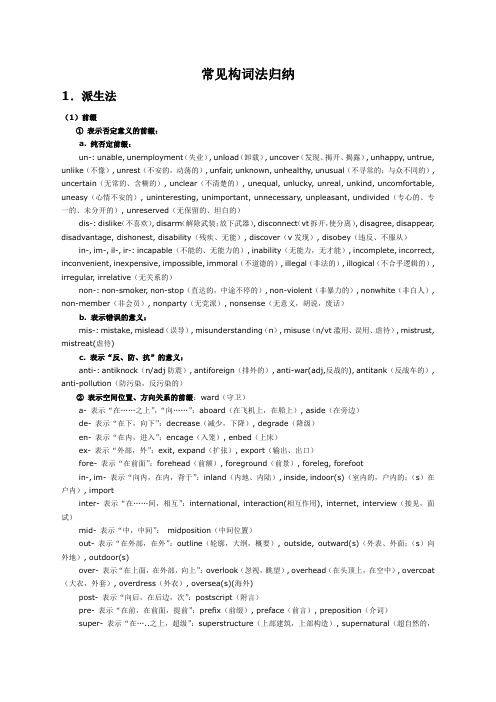
常见构词法归纳1.派生法(1)前缀①表示否定意义的前缀:a. 纯否定前缀:un-: unable, unemployment(失业), unload(卸载), uncover(发现、揭开、揭露), unhappy, untrue, unlike(不像), unrest(不安的,动荡的), unfair, unknown, unhealthy, unusual(不寻常的;与众不同的), uncertain(无常的、含糊的), unclear(不清楚的), unequal, unlucky, unreal, unkind, uncomfortable, uneasy(心情不安的), uninteresting, unimportant, unnecessary, unpleasant, undivided(专心的、专一的、未分开的), unreserved(无保留的、坦白的)dis-: dislike(不喜欢), disarm(解除武装;放下武器), disconnect(vt拆开,使分离), disagree, disappear, disadvantage, dishonest, disability(残疾、无能), discover(v发现), disobey(违反、不服从)in-, im-, il-, ir-: incapable(不能的、无能力的), inability(无能力,无才能), incomplete, incorrect, inconvenient, inexpensive, impossible, immoral(不道德的), illegal(非法的), illogical(不合乎逻辑的), irregular, irrelative(无关系的)non-: non-smoker, non-stop(直达的,中途不停的), non-violent(非暴力的), nonwhite(非白人), non-member(非会员), nonparty(无党派), nonsense(无意义,胡说,废话)b. 表示错误的意义:mis-: mistake, mislead(误导), misunderstanding(n), misuse(n/vt滥用、误用、虐待), mistrust, mistreat(虐待)c. 表示“反、防、抗”的意义:anti-: antiknock(n/adj防震), antiforeign(排外的), anti-war(adj,反战的), antitank(反战车的), anti-pollution(防污染,反污染的)②表示空间位置、方向关系的前缀:ward(守卫)a- 表示“在……之上”,“向……”:aboard(在飞机上,在船上), aside(在旁边)de- 表示“在下,向下”:decrease(减少,下降), degrade(降级)en- 表示“在内,进入”:encage(入笼), enbed(上床)ex- 表示“外部,外”:exit, expand(扩张), export(输出、出口)fore- 表示“在前面”:forehead(前额), foreground(前景), foreleg, forefootin-, im- 表示“向内,在内,背于”:inland(内地、内陆), inside, indoor(s)(室内的,户内的;(s)在户内), importinter- 表示“在……间,相互”:international, interaction(相互作用), internet, interview(接见,面试)mid- 表示“中,中间”:midposition(中间位置)out- 表示“在外部,在外”:outline(轮廓,大纲,概要), outside, outward(s)(外表、外面;(s)向外地), outdoor(s)over- 表示“在上面,在外部,向上”:overlook(忽视,眺望), overhead(在头顶上,在空中), overcoat (大衣,外套), overdress(外衣), oversea(s)(海外)post- 表示“向后,在后边,次”:postscript(附言)pre- 表示“在前,在前面,提前”:prefix(前缀), preface(前言), preposition(介词)super- 表示“在…..之上,超级”:superstructure(上部建筑,上部构造), supernatural(超自然的,不可思议的), superpower(超强特权,超强大国), superman, supermarkettrans- 表示“移上,转上,在那一边”:translate, transform(转变、转换、转移), transplant(移植), transportation(交通)under- 表示“在…..下面,下的”:underline(下划线,强调,在下面划线), underground, underwater, undershirt(贴身内衣,美式)up- 表示“向上,向上面,在上”:upward(s)(向上的,上升的), uphold(支撑,鼓励), uphill(上坡),upload (上传)auto- 表示“自己,独立,自动”:automobile(自动车), autobiography[??t?ba?'?gr?f?(自传)tele- 表示“远离”:television, telephone , telegram(电报), telegraph(电报,抽象名词), telescope (望远镜)③表示时间,序列关系的前缀:fore- 表示“在前面,先前,前面”:foreword(前言), forecast(预报), foretell(预言), foresee(预见), foreknow(先知), foreknowledge(先知)mid- 表示“中,中间”:midnight, midsummer, mid-day, mid-autumn(中秋节)post- 表示“在后,后”:postwar(战后的,战后时期), postgraduate(研究生), postdate(事后日期,推迟日期)pre- 表示“在前,事先,预先”:preheat(预先加热), prewar, prehistory(史前), preview(预习), prebattle, prepay(预付)re- 表示“再一次,重新”:retell(复述), rewrite, renew(续借), reconsider(重新考虑), reuse, remarry, recycle(再生,回收利用), rebuild(重建,改造)④表示比较程度差别关系的前缀:by- 表示“副,次要的”:byproduct(副产品), bywork(副业)extra- 表示“超越,额外”:extraordinary(非凡的,特别的)over- 表示“超过,过度,太”:overeat(吃过多), oversleep(睡过头), overpraise(过奖), overwork, overact(行为过分), overdo(夸张,做得过分)under- 表示“低劣,低下”:undersize(尺寸不足), undergrown(发育不全的), underproduction (生产不足)vice- 表示“副,次”:vice-president, vice –chairman,vice-monitor⑤表示共同,相等意思的前缀:co- 表示“共同,一起”:coexist(共同生存), co-operate, co-worker, coactions(合作行动), coauthor (合作作者)⑥表示某种状态,构成形容词、副词或动词:a- afraid, alive, alone, asleep, ashamed, aloud, ahead, aside, alike, awake⑦表示分离,离开意思的前缀:a- 表示“分离,离开”:away, apartde- 表示“离去,处去”:depart, decolour⑧表示“自我”:self- self-protect(ion), self-made, self-knowledge⑨表示变换词类作用的前缀:be- befrienden- enslave(束缚;征服), enable(使能够), enrich(使充实,使肥沃,使富足), enlarge(扩大,使增大), encourage(鼓励)⑩表示数量关系的前缀:a. 表示“单一”,“一”:uni- uniform(统一服装), unicellular(单细胞)b. 表示“二,两,双”:bi- bicycle(cycle循环,周期)twi- twilight(昏暗的,黎明)c. 表示“半,一半”:semi- semiconductor(半导体), semicircle(半圆), semimonthly(半月刊), semifinal(半决赛)d. 表示“百,百分之一”:centi- centimetere. 表示“千,千分之一”:kilo- kilometer, kilogram, kilowattf. 表示“微小”:micro- microvolt(微伏特), microcomputer(微机), microscope(显微镜)g. 表示“许多,复,多数”:multi- multimedia(多媒体), multicolored, multiform, multinaturalh. 表示“千分之一、毫”:milli- millimeter, milligrami. 表示“微小、微型”:mini- minibus, miniskirt, minipark(2)后缀①名词后缀:a. 具有某种职业或动作的人:-an, -ian, -ician 表示“……地方的人,精通……的人”:American, Asian, Australian, Russian, Italian , historian(历史学家), librarian(图书管理员), electricia(电工)n, magician(魔术师), technician, musician, politician(政客)-ant,-ent 表示“……人”:merchant, servant(仆人,佣人), assistant, agent, student,-ee 表示“动作承受者”:employee(雇员), examinee(应试者), payee(收款人), interviewee -eer 表示“从事于……人”:engineer, volunteer(志愿者)-er 表示“从事某种职业的人, 某地区,地方的人”:banker, observer, Londoner, villager singer, driver, writer, speaker, traveller, buyer-or 表示“……者”:author, doctor, operator, actor, visitor, inventor, educator-ar, -ary 表示“……的人, 从事……的人”:scholar, liar, beggar, secretary, missionary-ese 表示“……国人,……地方的人”:Chinese, Japanese, Cantonese(广东人)-ess 表示“阴性人称名词”:actress(女演员), hostess(女主人), manageress(女经理)-ist 表示“从事……研究者,信仰……主义者”:pianist, communist, dentist, artist, chemist, socialist, typist, receptionist-icist 表示“……家,……者, ……能手”:physicist(物理学家), phoneticist(语音学家), technicist (技术师)-logist 表示“……学家,研究者”:biologist(生物学家), geologist(地质学家)b. 构成具有抽象名词的含义:-age 表示“状态,行为,身份及其结果,总称”:courage, storage, marriage, percentage-al 表示“事物的动作,过程”:refusal(拒绝), arrival, survival(幸存), denial(否认), approval(批准,认可,赞成), trial(实验)-ance, -ence 表示“性质,状况,行为,过程,总量,程度”:importance, distance, avoidance(逃避,废止), appearance, performance(性能,绩效,表演), difference, obedience(顺从,服从), presence (出席,参加), existence-ancy, -ency 表示“性质,状态,行为,过程”:frequency(频繁), urgency(紧急), efficiency(高效率),-ity 表示“性质,状态,程度”:purity(纯度(化学)), reality, equality(平等)-bility 表示“动作,性质,状态”:ability, possibility, probability, responsibility-dom 表示“等级,领域,状态”:freedom, kingdom(王国,界), wisdom(智慧,才智)-ery, -ry 表示“行为,状态,习性,性质”:bravery(勇敢,勇气), slavery(奴役)-hood 表示“资格,身份, 年纪,状态”:childhood, girlhood(少女时期), boyhood(少年时代), manhood (男子气概)-ice 表示“行为,性质,状态”:notice, justice(司法), service-ing 表示“动作的过程,结果”:building, writing, learning-ion, -ation, -ition, -sion 表示“行为的过程,结果,状况”:suggestion, action, solution, invention, direction(方向,指导), correction(改正,修正), collection, instruction(指令,指示), destruction (破坏), introduction, congratulation , dictation(听写,口述), invitation(邀请), pronunciation, examination, graduation, operation, education, information, translation, starvation(饿死,绝食), satisfaction, relation, determination(决心,果断), preparation, imagination, explanation(说明,解释), opposition (反对), competition(竞赛,比赛), description, decision, division(除法), conclusion, impression (印象), expression(表达,表示), admission(承认), permission(允许,许可), discussion -ment 表示“行为,状态,过程,手段及其结果”:disappointment(失望), treatment, movement, judgment, punishment, argument, agreement(协议), government, development, improvement(改进,改善), requirement(要求,必要条件), encouragement-ness 表示“性质,状态,程度”:goodness(adj,善良,精华), kindness, tiredness, friendliness (友谊), business, illness, happiness(幸福), willingness(乐意,心甘情愿), weakness, fairness(公平)-ism 表示“制度,主义,学说,信仰,行为”:socialism(社会主义), criticism(批评), heroism(英勇), tourism, communism(共产主义), Marxism(马克思主义)-ship 表示“情况,性质,技巧,技能及身份,职业”:hardship(困苦,苦难), relationship, membership (资格,会员身份), friendship, ownership(所有权), scholarship(奖学金),-th, 表示“动作,性质,过程,状态”:strength, length, width, depth, wealth, truth, growth, warmth (温暖), youth-ure 表示“行为,结果”:exposure(暴露), pressure(压力), failure, procedure(手续), mixture -craft 表示“工艺”:aircraft, needlecraft, woodcraftc. 带有场所,地方的含义:-age 表示“住所,地点”:village, cottage(小屋,村舍)-ary 表示“住所,场地”:library, granary (谷仓)-ory 表示“工作场所,住处”:factory, dormitory, laboratory, observatory(天文台,气象台)②形容词后缀:a. 带有“属性,倾向,相关”的含义:-able, -ible: movable, comfortable, eatable, enjoyable, acceptable, reasonable, applicable(可适用的), visible(可见物), responsible, terrible(可怕的), horrible(恐怖的)-al: natural, additional(额外的,附加的), educational, national(国家的,国民的)-ant, -ent: distant, important, excellent-ing(表示特征:令人觉得): moving, touching, daring, interesting, exciting, disappointing , boring, amazing-ed(表示情绪:觉得): pleased, interested, surprised, worried, excited, bored, determined(决定了的,果断的), delighted(高兴的,欣喜的)-ish: foolish, bookish(出本上的,好读书的), selfish-ive: active, impressive(感人的,令人钦佩的), decisive(决定性的,果断的), active,expensive, progressive(改革的,进步的)b. 表示“相象,类似”的含义:-ish: boyish, childish(幼稚的,孩子去的)-like: manlike(有男子气概的,像男子的), childlike(天真浪漫的,像孩子的)-some: troublesome(麻烦的,讨厌的), handsome-y: milky, cloudy sunny, windy, rainy, foggy(有雾的,模糊的), healthy, wealthy, worthy, bloody (血腥的), funny, dirty, lucky, noisy, salty, smelly(发臭的), hilly(丘陵的,陡的)-ly: manly, fatherly, motherly, sisterly, brotherly, daily, weekly, monthly, quarterly, yearly, friendly, lonely, orderly, lovely(可爱的,令人愉快的), lively(活泼的,生动的), likely(很可能的), scholarly (博学的,学着风度的)c. 表示“充分的”含义:-ful: beautiful, wonderful, helpful, truthful, successful, harmful, useful, careful, forgetful, merciful(仁慈的,宽容的)-ous: dangerous, courageous(有胆量的,勇敢的), nervous(紧张不安的), mountainous(多山的), humorous(诙谐的,幽默的), various(各种各样的)d. 表示由某种物质形成,制成或生产的含义:-en: wooden, golden, woolen(羊毛的)e. 表示方向的含义:-ern: eastern, western, southern, northern, southeastern, northwestern-ward: downward(向下的), forwardf. 表示“数量关系”的含义:-teen: thirteen-ty: fifty-th: fourth, fiftiethg. 表示国籍,语种,宗教的含义:-an: Roman, European-ese: Chinese, Japanese-ish: English, Spanishh. 表示否定:-less: countless(无数的,数不尽的), stainless(不锈的), wireless, useless, endless(无止境的,连续的), priceless(无价的,贵重的), hopeless③动词后缀:-ize, ise 表示“做成,变成,……化”:modernize(现代化), democratize(民主化), organize, apologize, realize-en 表示“使成为,引起,使有”:quicken,(加快)weaken, soften, harden(变硬,变坚强)-fy 表示“使……化, 使成”:beautify, purify(净化), intensify, signify, simplify(简化), satisfy④副词后缀:-ly: possibly, swiftly(很快地), simply(简单地)-ward(s): downward, inwards(向内地), upward(向上地,上升地)-ways: always, sideways(向侧面的,一旁的)-wise: otherwise(另外的,否则,adj,adv), clockwise(顺时针方向地)注意:有的单词有双重后缀,如:use(用途)→useless(无用的)→uselessness(无用)self(自己)→selfish(自私的)→selfishness(自私)有的单词则是前后缀同时使用,如:important→importance→unimportanceregular(有规律的,有规则的)→irregular(无规律的,不规则的)→irregularity(无规律,不规则)2.合成法boyfriend, girlfriend, bus-driver, playground, radioactive(放射性的), headmaster(校长), sunshine, notebook, armchair(扶手椅), wheelchair(轮椅), postcard(明信片), football, spaceship, blackboard, firefighter(消防队员), fireman, gateman(看门人,售票员), chairman(主席,会长), weatherman, businessman, armyman(军人), postman, sportsman, bedroom, reading-room, classroom, newspaper, pickpocket(扒手), she-goat(雌性山羊), editor-in-chief(主编), daybreak由三个词构成的合成形容词:heart-to-heart, two-year-old, eight-metre-long3.转化法(1)名词→动词hand(手→传递)back(背部,后面→支持,后退)charge(费用→收费)copy(抄本,复印件→抄写,复印)flood(洪水→淹没)heat(热量→加热)paint(油漆→刷漆)phone(电话→打电话)pin(别针→装订)waste(废物→浪费)face(脸→面对)use(用途→使用)interest(兴趣→使兴趣)surprise(惊讶→使惊讶)taste(味道→品尝)smell(气味→闻)break(短暂休息→折断)present(礼物→赠送)(2)形容词→动词clean(干净→使干净,打扫)clear(清楚→清理)dirty(脏→弄脏)dry(干燥→烘干,晒干)empty(空的→倒空)free(自由→使自由,释放)slow(慢的→放慢)warm(暖和→使暖和)cool(凉的→冷却)quiet(安静→使安静)4.截短法(缩略法)截短法,即将单词缩写,词义和词性保持不变,主要有截头、去尾、截头去尾等形式。
【17】第十七讲 构词法(2)

5. Oxbridge is the first choice for students from abroad.
牛津大学和剑桥大学是外国学生留学首选地。
【答案】取两个单词的部分字母组合成新的单词
Hale Waihona Puke 16. The typical food for the Dragon Boat Festival is zongzi.
前缀
词缀含义
例词
含义
前缀适用条 件
disagree dishonest disadvantage
放动词前 放形容词前 放名词前
3 表示否定意义的前缀有哪些?
完成下表,注意各单词前缀及其相关用法
前缀
词缀含义
例词
含义
dis
不
disagree
不同意
放动词前
前缀适用条 件
不
dishonest
不诚实的
放形容词前
构词法
1 英语单词有哪些构词方法?
指出下列各句画线部分单词的构词方式
1. When he has a walk after supper, he usually walks his dog.
他晚餐后散步时常遛狗。
【答案】 (词性)转化
1
2. His carelessness cost him his first place in the math competition.
错误地 除掉
misunderstan d
defrost
反抗/防止 antiJapanese
误解 除霜 抗日的
相反
counterattack
构词法知识-2
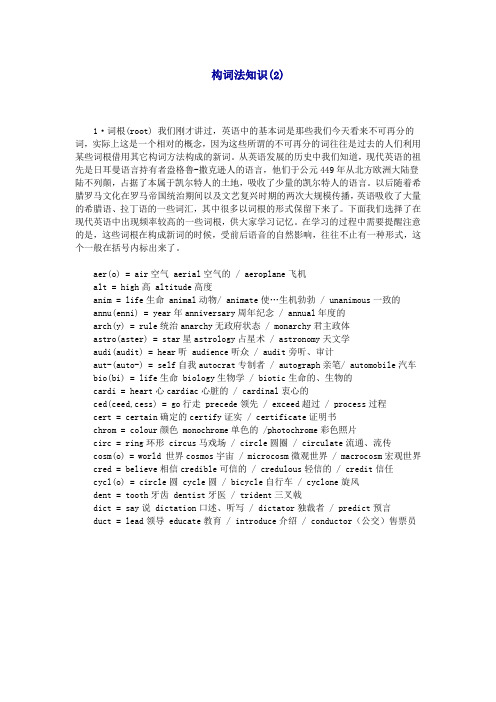
构词法知识(2)1·词根(root) 我们刚才讲过,英语中的基本词是那些我们今天看来不可再分的词,实际上这是一个相对的概念,因为这些所谓的不可再分的词往往是过去的人们利用某些词根借用其它构词方法构成的新词。
从英语发展的历史中我们知道,现代英语的祖先是日耳曼语言持有者盎格鲁-撒克逊人的语言,他们于公元449年从北方欧洲大陆登陆不列颠,占据了本属于凯尔特人的土地,吸收了少量的凯尔特人的语言。
以后随着希腊罗马文化在罗马帝国统治期间以及文艺复兴时期的两次大规模传播,英语吸收了大量的希腊语、拉丁语的一些词汇,其中很多以词根的形式保留下来了。
下面我们选择了在现代英语中出现频率较高的一些词根,供大家学习记忆。
在学习的过程中需要提醒注意的是,这些词根在构成新词的时候,受前后语音的自然影响,往往不止有一种形式,这个一般在括号内标出来了。
aer(o) = air空气 aerial空气的 / aeroplane飞机alt = high高 altitude高度anim = life生命 animal动物/ animate使…生机勃勃 / unanimous一致的annu(enni) = year年anniversary周年纪念 / annual年度的arch(y) = rule统治anarchy无政府状态 / monarchy君主政体astro(aster) = star星astrology占星术 / astronomy天文学audi(audit) = hear听 audience听众 / audit旁听、审计aut-(auto-) = self自我autocrat专制者 / autograph亲笔/ automobile汽车bio(bi) = life生命 biology生物学 / biotic生命的、生物的cardi = heart心cardiac心脏的 / cardinal衷心的ced(ceed,cess) = go行走 precede领先 / exceed超过 / process过程cert = certain确定的certify证实 / certificate证明书chrom = colour颜色 monochrome单色的 /photochrome彩色照片circ = ring环形 circus马戏场 / circle圆圈 / circulate流通、流传cosm(o) = world 世界cosmos宇宙 / microcosm微观世界 / macrocosm宏观世界cred = believe相信credible可信的 / credulous轻信的 / credit信任cycl(o) = circle圆 cycle圆 / bicycle自行车 / cyclone旋风dent = tooth牙齿 dentist牙医 / trident三叉戟dict = say说 dictation口述、听写 / dictator独裁者 / predict预言duct = lead领导 educate教育 / introduce介绍 / conductor(公交)售票员。
构词法2第四讲

首字母拼写词 Acronymy:
joining the initial letters of names of social and political organization or special noun phrases and technical terms. 如:
• 模拟人发出的声音:
giggle, titter, mummur, whimper, hiss, babble • 模拟动物鸣叫:
cuckoo, cricket, howl, squeal, twitter • 模拟事物声音:
bubble, splash, clink, tinkle, clash, thump, bang…
4. 截除词腰 (syncope) fluidics-fluidonics fossilation-fossilization
Note: changes in spelling and pronunciation fridge, bike, mike, coke
首字母缩略 initialism: 用词的第一个字母代表一个 词组的缩略词.如:
From “How Does the Water Come Down at Lodore”
---by Robert Southey
Alexander Pope 在论及声音和意义的关系写道:
True Ease in Writing comes from Art, not Chance, As those move easiest who have learn’d to dance Tis not enough no Harshness gives Offence, The Sound must seem an Echo to the Sense. Soft is the Strain when Zephyr gently blows, And the smooth Stream in smother Numbers flows; But when loud Surges lash the sounding Shore, The hoarse rough Verse shou’d like the Torrent roar.
构词法2

un- (not)unable, uncover(揭开, 揭露), undo, undoubtedly, undress(使脱衣服, 暴露), uneasy, unemployment *, unexpected, unfold *(打开, 显露), unfortunately, unimportant, unlike, unload(卸货, 卸载), unusualnon- (not)nonsmoker, nonexistence, non-cooperation, nonstop, nonmetal(非金属), nonresident(没有任何住所的), nonsense(胡说, 废话)mis- (wrong, wrongly)misjudge(判断错), misunderstand, mislead(误导), misspell, misstep(失足), misfortune(不幸, 灾祸), misusede- (showing the opposite, to remove, to reduce)deform(变形), deface(丑化, 使失面子), demobilize(复员), destruction, deforest(采伐森林, 清除树林), denationalize(非国有化), depress(使沮丧, 使消沉, 压下), depression, devalue(减值, 贬值), decode (解码, 译解)^, decrease, degenerate *(退化), degrade *(降级, 堕落, 退化), descend (下来, 下降), descendant *(子孙, 后裔, 后代), descent *(降下, 降落)pre- (before, in advance)prefix ^, pre-historic, precaution(预防, 警惕), precede *(领先, 在...之前, 先于), preceding(在前的, 前述的), preclude *(排除), predecessor *(前辈, 前任), predict, predominant *(卓越的, 支配的, 主要的), preface(序文, 前言), prejudice(偏见, 成见), preliminary(预备的, 初步的), premature *(未成熟的,早熟的), premier *(总理), premise *(提论,假定), premium *(额外费用, 奖金, 保险费), preparation, prepare, prepay(预付), preside *(主持), president, presumably(推测起来, 大概), presume *, pretext *(借口, 托辞), prevail(流行, 盛行), prevent, previous(在前的, 早先的), prewarante-, (before, in advance) crystal clearanteroom(接待室, 前厅), ante-Christian, antemeridian(上午的), anticipate (预期, 期望), antique(古物, 古董)thermo- (heat)thermo-chemistry(热化学), thermometer(温度计)vice- (next in rank below)vice-chairman, vice-president can did ate1。
构词法2

2. 略去前部, 保留后部。如: airplane → plane 飞机 telephone → phone 电话
3. 略去两头, 保留中部。如: influenza → flu 流感 detective → tec 侦探
6. 保留开头一个字母。如:
British Broadcasting Corporation
export 出口 outline大纲 outward 在 外
附 by-附近, 邻近, bypath侧道bypass支路 近 边侧 之 inter- 在…… interaction交互作用 间 间, 相互 intercontinental洲际的 通 trans- 跨越, 过 移, 遍及 transform使改变形态,使 改观
肯 定 1.responsible 2.selfish
3.honest 4.ability 5.e负责任的
unselfish无私的 dishonest不诚实的 inability无能
6.approval 7.important 8.lucky 9.necessary 10.moral
意思有一定的变化: He was about the same build as his brother.他的体形和他哥哥差不多。 Women have a equal say in everything.妇女在各方面都有同样的 发言权。
名词可以当动词用 (1)许多表示物件的名词可以用做动词, 表 示动作。 Have you booked your ticket? (预定) It can seat a thousand people. (容纳)
三、猜测以下句子划线单词的意思并翻 译句子。
1.All your luggage will be transported to the destination by train.
英语主要有三种构词法
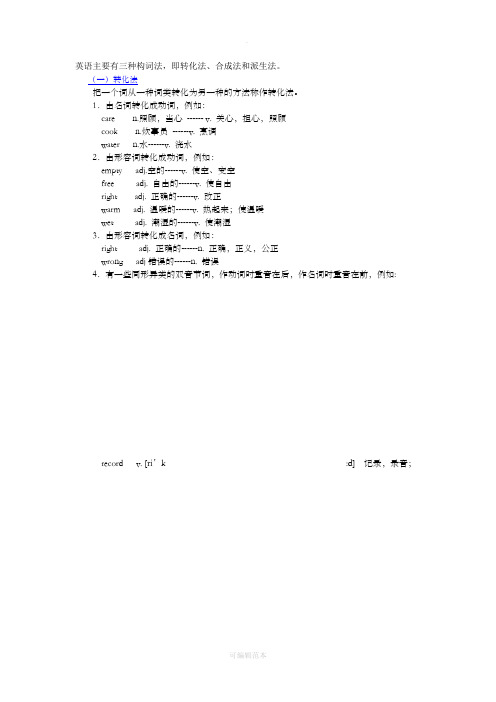
英语主要有三种构词法,即转化法、合成法和派生法。
(一)转化法把一个词从一种词类转化为另一种的方法称作转化法。
1.由名词转化成动词,例如:care n.照顾,当心------ v. 关心,担心,照顾cook n.炊事员------v. 烹调water n.水------v. 浇水2.由形容词转化成动词,例如:empty adj.空的------v. 使空、变空free adj. 自由的------v. 使自由right adj. 正确的------v. 改正warm adj. 温暖的------v. 热起来;使温暖wet adj. 潮湿的------v. 使潮湿3.由形容词转化成名词,例如:right adj. 正确的------n. 正确,正义,公正wrong adj错误的------n. 错误4.有一些同形异类的双音节词,作动词时重音在后,作名词时重音在前,例如:record v. [ri’k:d] 记录,录音;record n. [’ r ek:d] 记录,唱片有个别词,作形容词时重音在前,作动词时重音在后,例如:perfect adj. [’p∂:f ikt] 完美的;perfect v. [p∂’fekt] 使完善5.有些词,因词尾有清辅音和浊辅音的差别而属不同词类。
一般说来,词尾发清辅音的多为名词,发浊辅音的多为动词。
词尾读音不同,拼法也常不一样。
但s和th既可读作清辅音,又可读作浊辅音,因而有时没有拼法的变化。
例如:advice [∂d’v ais] n. ; advise [∂d’v aiz] v.excuse [iks’kju:s] n. ; excuse [iks’kju:z] v.use [ju:s] ; use [ju:z] v.个别词拼法稍有差别,但读音相同,例如:practice n.; practise v.还有一些词在转变为另一词类时,元音和拼法同时发生变化,例如:food [fu:d]食物n. ; feed[fi:d]喂养,给以食物v.有些词既可作形容词又可作动词,词形不变而读音不同,例如:live adj. [laiv]活的,活泼的; v. [liv] 活着,生活(二)合成法两个或两个以上的词结合成一个新词的方法称作合成法。
英语单词构词法_(2)后缀
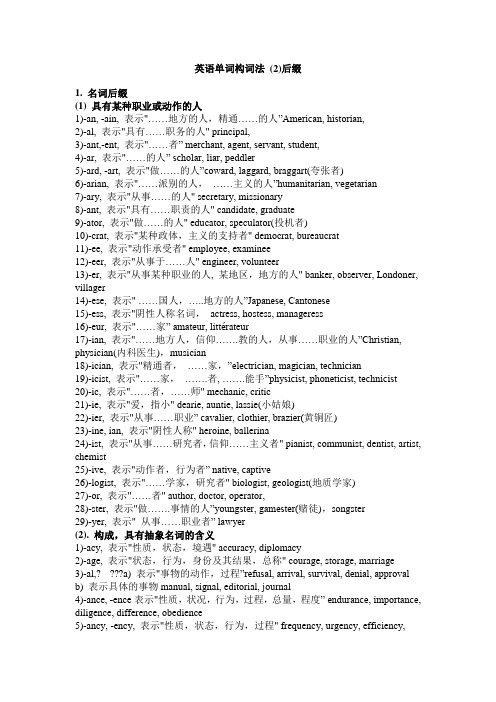
英语单词构词法(2)后缀1. 名词后缀(1) 具有某种职业或动作的人1)-an, -ain, 表示"……地方的人,精通……的人”American, historian,2)-al, 表示"具有……职务的人" principal,3)-ant,-ent, 表示"……者” merchant, agent, servant, student,4)-ar, 表示"……的人” scholar, liar, peddler5)-ard, -art, 表示"做……的人”coward, laggard, b raggart(夸张者)6)-arian, 表示"……派别的人,……主义的人”humanitarian, vegetarian7)-ary, 表示"从事……的人" secretary, missionary8)-ant, 表示"具有……职责的人" candidate, graduate9)-ator, 表示"做……的人" educator, speculator(投机者)10)-crat, 表示"某种政体,主义的支持者" democrat, bureaucrat11)-ee, 表示"动作承受者" employee, examinee12)-eer, 表示"从事于……人" engineer, volunteer13)-er, 表示"从事某种职业的人, 某地区,地方的人" banker, observer, Londoner, villager14)-ese, 表示" ……国人,…..地方的人”Japanese, Cantonese15)-ess, 表示"阴性人称名词,actress, hostess, manageress16)-eur, 表示"……家” amateur, littér ateur17)-ian, 表示"……地方人,信仰…….教的人,从事……职业的人”Christian, physician(内科医生),musician18)-ician, 表示"精通者,……家,”electrician, magician, technician19)-icist, 表示"……家,…….者, …….能手”physicist, phoneticist, technicist20)-ic, 表示"……者,……师" mechanic, critic21)-ie, 表示"爱,指小" dearie, auntie, lassie(小姑娘)22)-ier, 表示"从事……职业” cavalier, clothier, brazier(黄铜匠)23)-ine, ian, 表示"阴性人称" heroine, ballerina24)-ist, 表示"从事……研究者,信仰……主义者" pianist, communist, dentist, artist, chemist25)-ive, 表示"动作者,行为者” native, captive26)-logist, 表示"……学家,研究者" biologist, geologist(地质学家)27)-or, 表示"……者" author, doctor, operator,28)-ster, 表示"做…….事情的人”youngster, gamester(赌徒),songster29)-yer, 表示" 从事……职业者” lawyer(2). 构成,具有抽象名词的含义1)-acy, 表示"性质,状态,境遇" accuracy, diplomacy2)-age, 表示"状态,行为,身份及其结果,总称" courage, storage, marriage3)-al,? ???a) 表示"事物的动作,过程”refusal, arrival, survival, denial, approvalb) 表示具体的事物manual, signal, editorial, journal4)-ance, -ence表示"性质,状况,行为,过程,总量,程度” endurance, importance, diligence, difference, obedience5)-ancy, -ency, 表示"性质,状态,行为,过程" frequency, urgency, efficiency,6)-bility, 表示"动作,性质,状态" possibility, feasibility,7)-craft, 表示"工艺,技巧” woodcraft, handicraft, statecraft(治国策)8)-cracy, 表示"统治,支配" bureaucracy, democracy9)-cy, 表示"性质,状态,职位,级别" bankruptcy(破产),supremacy10)-dom, 表示"等级,领域,状态" freedom, kingdom, wisdom11)-ery, -ry, 表示"行为,状态,习性" bravery, bribery, rivalry12)-ety, 表示"性质,状态” variety, dubiety(怀疑)13)-faction, -facture, 表示"作成,……化,作用" satisfaction, manufacture14)-hood, 表示"资格,身份, 年纪,状态" childhood, manhood, falsehood15)-ice, 表示"行为,性质,状态" notice, justice, service16)-ine, 表示"带有抽象概念" medicine, discipline, famine17)-ing, 表示"动作的过程,结果" building, writing, learning18)-ion, -sion, -tion, -ation, -ition, 表示"行为的过程,结果,状况" action, solution, conclusion, destruction, expression, correction19)-ise, 表示"性质,状态” exercise, merchandise(商业)20)-ism, 表示"制度,主义,学说,信仰,行为" socialism, criticism, colloquialism, heroism21)-ity, 表示"性质,状态,程度” purity, reality, ability, calamity22)-ment, 表示"行为,状态,过程,手段及其结果treatment, movement, judgment, punishment, argument23)-mony, 表示"动作的结果,状态" ceremony, testimony24)-ness, 表示"性质,状态,程度" goodness, kindness, tiredness, friendliness25)-or, -our, 表示"动作,性质,状态" favor, error,26)-osity, 表示"动作,状态” curiosity27)-ship, 表示"情况,性质,技巧,技能及身份,职业” hardship, membership, friendship28)-th, 表示"动作,性质,过程,状态" depth, wealth, truth, length, growth29)-tude, 表示"性质,状态,程度" latitude, altitude(海拔)30)-ure, 表示"行为,结果" exposure, pressure, failure, procedure(手续),31)-y, 表示"行为的结果,状态,性质” glory, history, victory, inquiry(3) 带有场所,地方的含义1)-age, 表示"住所,地点" village, cottage2)-ary, 表示"住所,场地" library, granary (谷仓)3)-ery, ry, 表示"工作场所,饲养所,地点" laundry, nursery, surgery(手术室)4)-ory, 表示"工作场所,住处" factory, dormitory, laboratory, observatory(4) 带有学术,科技含义1)-grapy, 表示"……学,写法” biography, calligraphy, geography2)-ic, ics, 表示"……学……法" logic, mechanics, optics, electronics3)-ology, 表示"……学……论”biology, zoology, technology(工艺学)4)-nomy, 表示"……学……术" astronomy, economy, bionomy(生态学)5)-ery, 表示"学科,技术" chemistry, cookery, machinery6)-y, 表示"……学,术,法” photography, philosophy(5) 表示人和事物的总和,集合含义1)-age, baggage, tonnage2)-dom, newspaperdom(新闻界)3)-hood, neighbourhood, womanhood4)-ery, cavalry, ministry(内阁)5)-ure, legislature, judicature(6) 表示物品和物质名称的含义1)-ant, ent, solvent, constant2)-al, signal, pictorial(画报)3)ar, collar, pillar(石柱)4)- er, boiler, computer, washer, cooker5)-ery, drapery(绸缎)6)-ing, clothing, matting,7)-ment, instrument, equipment, attachment(7) 表示“细小”的含义1)-cle, particle,2)-cule, molecule(分子)3)-el, parcel4)-en, chicken, maiden5)-et, pocket, ticket6)-etta, -ette, etto, cigarette, essayette(短文)7)-kin, napkin8)-ling, duckling,9)-let, booklet10)-y, baby, doggy2. 形容词后缀(1)带有“属性,倾向,相关”的含义1)-able, -ible, movable, comfortable, applicable, visible, responsible2)-al, natural, additional, educational3)-an, ane, urban, suburban, republican4)-ant, -ent, distant, important, excellent5)-ar, similar, popular, regular6)-ary, military, voluntary7)-ice, -atie, ical, politic, systematic, historic, physical,8)-ine, masculine, feminine, marine9)-ing, moving, touching, daring10)-ish, foolish, bookish, selfish11)-ive, active, impressive, decisive12)-ory, satisfactory, compulsory13)-il, -ile, -eel, fragile, genteel(文雅的)(2) 表示“相象,类似”的含义1)-ish, boyish, childish2)-esque, picturesque3)-like, manlike, childlike4)-ly, manly, fatherly, scholarly, motherly5)-some, troublesome, handsome6)-y, milky, pasty(3) 表示“充分的”含义1)-ful, beautiful, wonderful, helpful, truthful2)-ous, dangerous, generous, courageous, various3)-ent, violent,(4) 表示由某种物质形成,制成或生产的含义1)-en, wooden, golden, woolen2)-ous, gaseous3)-fic, scientific(5) 表示方向的含义1)-ern, eastern, western2)-ward, downward, forward(6) 表示“倍数”的含义1)-ble, double, treble2)ple, triple3)-fold, twofold, tenfold(7) 表示“数量关系”的含义1)-teen, thirteen2)-ty, fifty3)-th, fourth, fiftieth(8) 表示国籍,语种,宗教的含义1)-an, Roman, European2)-ese, Chinese,3)-ish, English, Spanish(9) 表示“比较程度”的含义1)-er, greater2)-ish, reddish, yellowish3)-est, highest4)-most, foremost, topmost(10)其他的含义-less, 表示否定,countless, stainless, wireless3. 动词后缀1)-ize, ise, 表示"做成,变成,……化“modernize, mechanize, democratize, organize2)-en, 表示"使成为,引起,使有” quicken, weaken, soften, harden3)-fy, 表示"使……化, 使成”beautify, purify, intensify, signify, simplify4)-ish, 表示"使,令” finish, abolish, diminish, establish5)-ate, 表示“成为……,处理,作用” separat e, operate, indicate4. 副词后缀1)-ly, possibly, swiftly, simply2)-ward, -wards, downward, inwards, upward3)-ways, always, sideways4)-wise, otherwise, clockwise。
- 1、下载文档前请自行甄别文档内容的完整性,平台不提供额外的编辑、内容补充、找答案等附加服务。
- 2、"仅部分预览"的文档,不可在线预览部分如存在完整性等问题,可反馈申请退款(可完整预览的文档不适用该条件!)。
- 3、如文档侵犯您的权益,请联系客服反馈,我们会尽快为您处理(人工客服工作时间:9:00-18:30)。
语言是随着人类社会的持续发展而发展的。
一些旧词的过时意味着需要人们创造出一些新的词,而新的词的产生,大抵服从语法的法则,有其规律可循。
语言的这种"弃旧创新"持续完善和发展的过程体现出一种规律--构词法
(word-formation)。
为何在学构词法?我们认为,对于普通的医务专业人员来说,学点英语的构词方式,有以下几方面的益处:
(1)了解词的结构,扩大巩固所学的词汇。
在阅读科技文章和专业资料时,碰到生字能够由已知的成分去分析未知词的含义,甚至能够"猜字"。
比如说,如果我们知道了词根anthropo-[man](人)的意思,就有难理解下面几个词的含义:anthropolgy(人类学)、anthropid(类人的)、anthropologist(人类学家)、anthropolgical(人类学的)、philanthropist(慈善家)、
misanthropist(厌世者)。
其次,学习构词的方法对词汇的记忆和联想也是大有协助的。
(2)为深刻理解词义有一定的协助,如:人称外词后缀-ster有时含有轻蔑意味:trickster(骗子手)、gamester(赌棍)、rhymster(打油诗人)、gangster(歹徒)、monster(恶人)等。
(3)培养灵活使用词语的水平和善于造词的本领。
比方,on-the-spot(现场的)、sixteen-in-one-group(十六进制的)、blue-black(蓝黑)、under-develop(发育不全)、middle-of-term(期中)、fecal-borne(粪便传播的)、hair-bulb(毛球)、fever-blister(发热性疱疹)、Mikulicz-Vladimiroff(米弗二氏)、mind-blindness (精神性盲)等等。
以上谈了构词的三种好处,但是也不能夸大其作用,因为词仅仅语言的基本素材,不能孤立看待。
构词往往没有一定成规,有时还要靠惯用法(us-age)决定。
初学者容易造出类似My doctor disadvised me to redouble my dosage(我的医生没有劝我加倍剂量)。
的句子。
这说明他们仅仅知其一而不知其二。
所以,为初学英语者来说,最好是先扩大词汇,再学点构词法,以避免错误的发生。
最常用的英语构词方法有以下三种
(1)转化法conversion 转化法就是把一个词从一种词类转成另一种词类。
例如:black a.(黑)→to blacken v.(使黑),这种转化被称为缀后(affixation)或派生(derivation).能够用改变词根的元音或辅音的方法,例如:hot a.(热)→to heat v.(热)、full a.(满)→to fill v.(装满)、whole a.(健康)→to heal v.(医治)、blood n.(血)→to bleed v.(出血)等,这叫做元级派生(primary derivation).也能够不改变词本身的拼法,转成其它词类,如:gangrene n.(坏疽)→gangrene v.(使生疽)、gargle n.(嗽喉)→gargle v.(嗽喉)、correct a.(准确的)→correct v.(纠正)、second num.(第二) →second vt.(支持)、image n.(影像)→image v.(作图像)sample n.(样品)→sample v.(取样),这些就属于转化(conversion)了。
除此之外,还能够有种种的词类转化。
(2)合成法(composition)合成法就是把两个以上的词、组合成一个复合词。
如:three year-old(三周岁的)、up-to-date(最新式的)、up-to-the-minute(非常时髦的)、peace-keeping(维持和平的)、take-off(飞机的起飞)、film-goers(电影观众)、easy-chair(沙发)、consulting-room(诊室)、over-estimate(估计过高)、outnumber(超过数目)、furrow-keratitis(勾状角膜炎)、esimate-ray (r射
线)、gas-forming (产气)、giant-cell(巨细胞)、group-specific(类属特异性的),等等。
(3)缀后法(affixation)缀后法指在词上附加前缀或后缀,构成新词。
比方名词兼动词的care的派生词有:careful a.→care n.+-ful (a. suf)、carefully
adv.→careful a.+-ly (adv. suf)、carefulness n.→careful a.+-ness (n.suf),又比方:动词connect 的派生词有:disconnect v.→dis-+con-nect n.( 使分开)、connective a.→connect v.+-jve(有连接作用的)和connection n.→connect v.+ -ion(连接)。
除了上面三种最常用的构词法外,还有其它的构词方式,如:反成法
(back-formation)缩略法(shortening),拟声法(imitation)和混合法(blend).因它们都不是本书讨论研究的重点,故这里就不再一一举例赘述了。
在开始研究本书的重点内容--缀合构词法之前,为方便起见,有必要先介绍几个相关词结构方面的概念。
(1)词根和词干(root and stem)长期以来,语言学家对词根root有两种不同的理解,其一中把词根严格看作单章节的原始意义单位,这种词根为数不多,在英语里,大约有460多个(见w.w.skeat,a primet if English etymology §102..)这对于研究词源学(etymology)或许是必要的,但对于普通的英语学习者,词不达意根就成了难以辩认的了,所以,它的用处不大。
例如:
narrow,narcissus,nerve,snare等词不达意的词不达意根都是sne.其二是把词不达意根看作同根词不达意共有的能够辩认的部分,不一定是单音节,也不一定是原始形式。
比如:医学方面的词根有:ophthalmo-(眼),esophage-(食道),epithelio(上皮),reticulo-(网状),erythro-(红)等。
换名话说,词不达意根指的是有些音节(不是前缀或后缀)在不同的词不达意里出现,而其根本形式和含义相同,如:error(错误),erratum(印刷错误),aberration(迷误),errkoneous(错的)的词不达意根都有是err-[to wander](离)。
(2)词干(stem) 指的是未经词形变化的原形词。
例如:动词to impede(hinder)的词根是impede,必须注意,词的词形变化(inflection)不属于构词法研究的对象,这是因为词的这些变化既不能改变词不达意的原意,又不能改变词类。
比如:动词teach有时态的变化,即能够在其后加时态的词尾-ed或-ing,但这并不表明构造出新的词来了。
(3)前缀和后缀(prefix and suffix)前缀的后缀都是词根或单词,它们原来故地是独立的词或词根,但因为经常缀在其它词或词根的前后,辅助中心意义,逐渐就失去了独立的形式,读音意义而成为附加部分。
前缀有一定的含义,缀前缀构成的词叫做合成词(compound).如:cohost →co-[together,with]+host.后缀只具有转变词的词类的功能,不改变其含义,但医学上,有些后缀本身有一定的含义。
例如:-ate(盐酸),-ase(酶)等。
缀后缀而成的词叫作派生词(derivative),例如:helpful a→help n. + -ful(a.suf),quickly adv. →quick a. + -ly (adv.suf)等。
